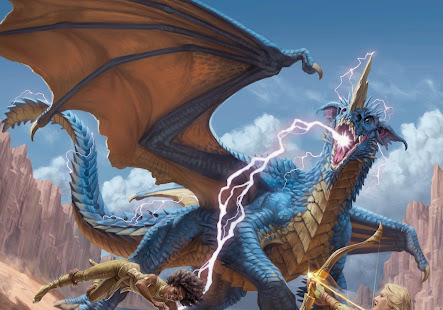Wizards initially offered a partial compromise, allowing existing OGL products to remain on sale and removing plans for licence charges for successful products using the D&D rules, but confirming they were pressing ahead with eliminating the OGL 1.0 for new products moving forwards. Creators would instead have to sign up to the OGL 2.0, which was still significantly more restrictive than the old 1.0 model that company had employed since 2000, and changes to the rules pertaining to the virtual tabletop (VTT) market would remain in place, effectively forcing online players to use Wizards' own D&D Beyond service with a subscription fee.
However, the creators of the OGL 1.0 voiced doubts that the original OGL could be legally revoked (they'd deliberately included language suggesting not), several companies mulled over legal challenges and multiple other RPG companies announced the creation of a rival open licence, which soon saw a large chunk of the tabletop RPG industry come on board.
Today Wizards of the Coast announced a comprehensive climbdown. They will no longer try to revoke the OGL 1.0, they will no longer try to impose their changes on the burgeoning virtual tabletop (VTT) market (with the 1.0 remaining in place, that's no longer possible) and they are in fact scrapping the entire OGL 2.0 initiative in favour of moving to a Creative Commons licence instead. They are releasing the rules for Dungeons & Dragons 5th Edition via a Systems Reference Document for use with either licence. Effectively, this is a return to the status quo, with a more comprehensive 5th Edition SRD as a result.
Wizards likely decided on the climbdown after seeing over 40,000 subscribers abandon their D&D Beyond platform in the space of three weeks, as well as a burgeoning campaign to boycott the forthcoming Dungeons & Dragons movie, Honor Among Thieves, which launches on 31 March. The film is the opening salvo of a broad-spectrum D&D assault on the multimedia space, with Hasbro keen to bring the franchise to film and television, as well as reinforcing its presence in video games (the highly-anticipated Baldur's Gate III launches later this year).
Whilst likely to be welcomed by those whose livelihoods were threatened, the climbdown is unlikely to erase the memory of Wizards' behaviour. Other companies have benefitted, most notably Paizo who make the rival Pathfinder fantasy RPG which was previously the dominant tabletop RPG from 2009 to 2015 before D&D supplanted them. Paizo reports selling out of all of its physical stock of its core rulebook in the last fortnight and is rushing reprints to meet renewed demand. Some other RPG creators are also reporting increased sales. Work on the rival open gaming licence is likely to continue.

Something something and find out.
ReplyDelete